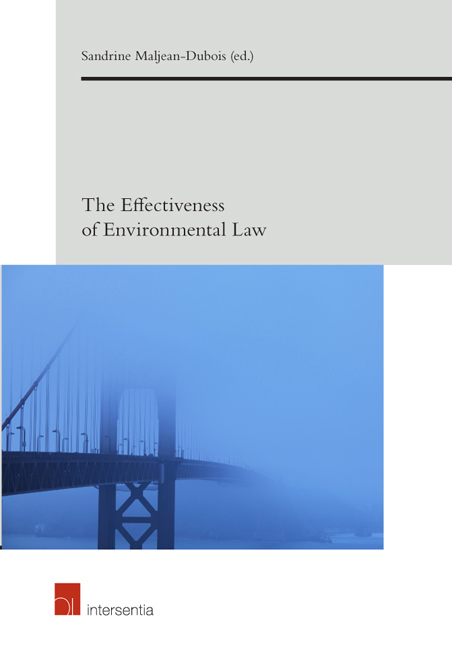Book contents
- Frontmatter
- Preface
- Contents
- Introduction. The Effectiveness of Environmental Law: A Key Topic
- Part 1 Measuring and Assessing Effectiveness
- Part 2 Improving Effectiveness
- Better Legislation
- Chapter 2 The Effectiveness of Payment for Ecosystem Services: a mix between a gradient model of public intervention and an effective normative framework
- Chapter 3 The Effectiveness of Environmental Law through Contracts
- Chapter 4 Legal Weaknesses and Windows of Opportunity in Transnational Biodiversity Protection: as Seen through the Lens of an Ecosystem Approach-Based Paradigm
- Chapter 5 Better Expertise through Institutional Linkages. The Case of the Mediterranean Basin
- Chapter 6 Environmental Dignity Rights
- Chapter 7 The Environmental Protection of Traditional Knowledge and the Active Participation of Indigenous Peoples in the Planning, Management and Decision-Making Processes as Means of Improving the Effectiveness of Environmental Law
- Chapter 8 Promoting Electricity from Renewable Energy Sources in France. Is French Law Appropriate for Achieving the Objectives?
- Chapter 9 Changing Patterns of International Environmental Law-Making: Addressing Normative Ineffectiveness
- Chapter 10 The Effectiveness of EU Nature Legislation: a long battle to secure supporting sectoral policies
- Better Implementation
Chapter 5 - Better Expertise through Institutional Linkages. The Case of the Mediterranean Basin
from Better Legislation
Published online by Cambridge University Press: 27 September 2018
- Frontmatter
- Preface
- Contents
- Introduction. The Effectiveness of Environmental Law: A Key Topic
- Part 1 Measuring and Assessing Effectiveness
- Part 2 Improving Effectiveness
- Better Legislation
- Chapter 2 The Effectiveness of Payment for Ecosystem Services: a mix between a gradient model of public intervention and an effective normative framework
- Chapter 3 The Effectiveness of Environmental Law through Contracts
- Chapter 4 Legal Weaknesses and Windows of Opportunity in Transnational Biodiversity Protection: as Seen through the Lens of an Ecosystem Approach-Based Paradigm
- Chapter 5 Better Expertise through Institutional Linkages. The Case of the Mediterranean Basin
- Chapter 6 Environmental Dignity Rights
- Chapter 7 The Environmental Protection of Traditional Knowledge and the Active Participation of Indigenous Peoples in the Planning, Management and Decision-Making Processes as Means of Improving the Effectiveness of Environmental Law
- Chapter 8 Promoting Electricity from Renewable Energy Sources in France. Is French Law Appropriate for Achieving the Objectives?
- Chapter 9 Changing Patterns of International Environmental Law-Making: Addressing Normative Ineffectiveness
- Chapter 10 The Effectiveness of EU Nature Legislation: a long battle to secure supporting sectoral policies
- Better Implementation
Summary
INTRODUCTION
The Mediterranean Basin encapsulates all of the global issues of international environmental law. Identified as a hot spot for biodiversity, its environment is under constant anthropic pressure, resulting from the urbanization of coastlines, intense marine traffic, land-based pollution, overfishing or invasive alien species. Additionally, despite the strong involvement of the scientific community in these issues, there are still numerous questions left unanswered, be they about the state of the Mediterranean environment or on the exact impact of human activities.
In light of these various threats and uncertainties – that are not exclusive to the Mediterranean Basin –, States have sought, from early on, to co-operate in order to mitigate their impact on the environment. As a result, the region is nowadays characterized by the existence of numerous international multilateral legal instruments. Both specialized Mediterranean agreements and global conventions coexist and overlap, thus creating a Mediterranean “regime complex” for the environment in which countries with various economic and technical capacities have to co-operate (see figure 1). Still, despite this regional legal density, there is no clear sign of improvement of the Mediterranean environment, thus highlighting the lack of effectiveness of this whole regime complex. All in all, in this relatively small patch of land and sea, most of the common traits of international environmental law are apparent; namely: irreplaceable environment, scientific uncertainty, anthropic threats, high legal density, South/ North divide and a lack of effectiveness. This makes the Mediterranean Basin a particularly relevant case study with regards to international environmental law's effectiveness.
This chapter will focus on the relation that exists between law and science as a prerequisite, among others, for the effectiveness of international environmental law in the Mediterranean Basin. In order to examine this relationship, we will analyse the activities of Mediterranean Technical Bodies (MTBs) and try to determine if they match specific criteria. But, before doing so, we must first explain the concept of technical bodies (1.1) and specify the relevant criteria we seek to identify. (1.2). The relevance of legal instruments in this field also has to be clarified (1.3).
- Type
- Chapter
- Information
- The Effectiveness of Environmental Law , pp. 101 - 124Publisher: IntersentiaPrint publication year: 2017



